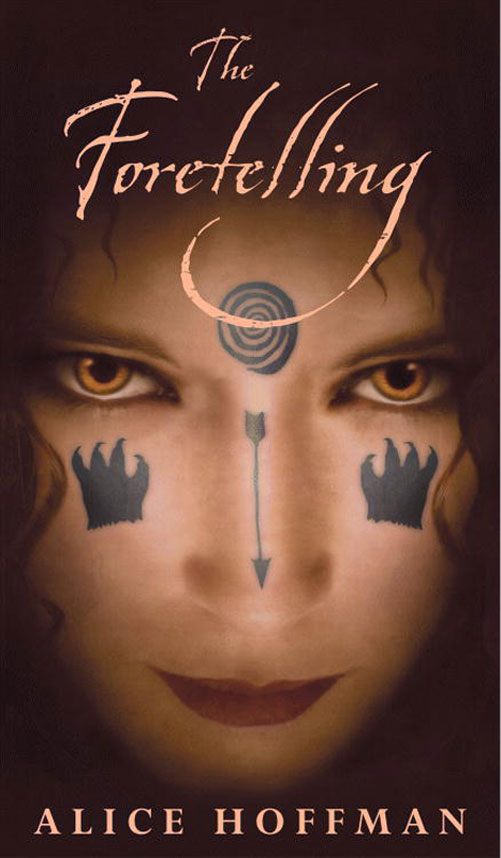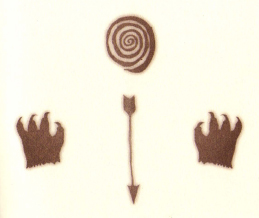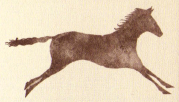The Foretelling


Text copyright © 2005 by Alice Hoffman
Illustrations copyright © 2005 by Matt Mahurin
Reader's Guide and author interview copyright © 2006
by Little, Brown and Company, Inc.
Little, Brown and Company
Hachette Book Group,
237 Park Avenue,
New York, NY 10017
Visit our Web site at
www.HachetteBookGroup.com
First eBook Edition: December 2008
The characters and events portrayed in this book are fictitious.
Any similarity to real persons, living or dead, is coincidental
and not intended by the author.
ISBN: 978-0-316-05577-2
The Little, Brown and Company name and logo are trademarks of Hachette Book Group, Inc.
Book design by Alyssa Morris
The illustrations for this book were created digitally by Matt Mahurin.
The text was set in Perpetua, and the display type is La Figura.
Contents
An Interview with Alice Hoffman

you are the prophecy.
You are what is to come.

I
WAS BORN OUT OF SORROW
, so my mother named me Rain.
Ours was a time of blood, when the sky reached on forever, when one horse became a hundred and then a thousand, when we wore our hair in long black braids and rode as warriors. Everything we had was given to us by the goddess, and everything we lost was taken away by her.
We lived in the time of fortune, in a world of only women. We were warriors from the very beginning, before we were born. There was no battle we could not win. We were strong, the strength of a thousand sisters. And we had something no one else had. Something that caused terror in our enemies when we came across the steppes. Something no one in the man's world had yet managed to do.
We rode horses.
It was said my great-grandmother the Queen had found a white mare in the snow and that she lay down beside this wild creature to warm herself and keep herself alive. My great-grandmother whispered certain words in the mare's ear that no man would ever think of saying. Ours was a country of snow for half the year, of ice and wind and the steppes that led to the Black Sea. By the time the ice had melted, my great-grandmother had made the first bridle out of her leather belt and the snow mare let herself be ridden. A horse and a Queen had become sisters; when they raced across the steppes they were two hearts pounding with a single thought in mind.
Horses were everything to us. Our goddess, our sisters, our sustenance. Alive, they were our way to win battles; four legs against men's two. Even when our horses’ lives were gone they were our tents, our clothes, our boots, our food, our traveling companions to the next world. Our children were raised on mares’ milk. It made us wild and quick and unafraid. It gave us the ability to speak the language of horses.
A language men had yet to learn.
In the time of our people we lived without men, as we always had. Men were our enemies, a distant, bitter land that came to try to defeat us, again and again. They called us Amazonia. They cursed us and our grandmothers. In their stories they vowed that we were demons, that our skins were blue, that we ate men for breakfast and had bewitched the entire race of horses to become not our sisters but our slaves. They wanted all that we had — our land, our cities, our horses, our lives. They thought women should be worthless, wives and slaves like their own kind.
We were too strong ever to be worthless. We gave in to no one, not the tribes from the east-lands, or the city of stones to the west, not the wild northern men from the ice mountains, not the wanderers who came from everywhere, searching for new kingdoms formed from our age-old land. They all dreamed the same thing: Our land would be named after their foolish kings. Our women would belong to them, walking behind them, in the dust.
But they couldn't defeat us.
They came to destroy us, but in the end they always ran from us in fear, thinking we were fiends — half-woman, half-horse, with the courage of both.
Blood made us stronger, and our fallen came back to us in our dreams and helped us in battle. Our Queen, Alina, was a gift from the goddess, beloved by all, but as unreachable as the stars, especially when it came to me, her own daughter. She was as cold to me as the white stones in the river, as distant as our winter country, far beyond the steppes. Deborah, our high priestess who could see the future and who knew the past, told me what had happened to my mother. Why she was so indifferent; why she'd never asked to see me, just the two of us, mother and daughter, so she could braid my hair, or tell me a story of the world and wars she'd seen.
Her story was not one she wanted to tell.
Some stories are born out of misery and ashes and blood and terror. Tell one of those and your mouth may blister. Your dreams may be turned inside out.
But the priestess whispered my mother's story to me with the voice of a raven, low and raspy with the knowledge of hardship and pain. Our enemy had trapped Alina when she was just a girl. Maybe they could tell she was to be our Queen, as her mother and grandmother had been, as I would be when my time came. Fifty men against a single one of our warriors, a warrior who happened to be a thirteen-year-old girl, my mother, Alina.
They knew how to be cowards. That's what the priestess said. One of them was my father, and Deborah told me that whatever strength all fifty had was now mine. I had stolen it from them, and it rightfully belonged to me along with my yellow eyes. I was stronger than all fifty of those dishonorable men, the enemies who thought my mother would die when they were done with her, who left her on the steppes at the time when the ground was mud and there was the buzzing of flies and the wheat and grass grew tall.
After she was found, my mother was bathed in a cauldron of mares’ milk, then given the bark of the laurel tree to chew for the pain of being violated and, more, for the gift of prophecy. Was it any wonder she didn't want to look into the future any more than she wanted to be reminded of the past? My mother wasn't interested in prophecies, or in any future that might be. She spat out the laurel. It was the here and now she claimed for herself. Alina was like a piece of ice in the sunlight, blinding and bright and unforgiving. Our people say the shadow is one of our souls, and my mother's shadow disappeared on the day she was violated. It shattered into black shards, then rose up like smoke. All that was left was the iron inside her; only the hardest part remained.
People told me that when I was born my mother kept her eyes closed; even then she would not cry out, though my birth was said to be difficult, with too much labor and too much blood. Nearly the end of her, it was rumored.
No wonder the Queen was cold. No wonder her hair was so black the ravens were jealous.
No wonder she looked away whenever I passed by.
My own mother whose blood ran through me, whom I was to follow onto a throne of bones and river rocks, never once touched me.
That was how I came to believe I was only sorrow, only rain, and that there was nothing more inside me.
But there was a voice beyond my mother's silence.
I was raised by Deborah and the other priestesses, the sacred prophecy women who wore black robes dyed with hazel. The songs that were my lullabies were Deborah's songs, and each one told me I was fit to be the Queen. My first taste of the world, even before mares’ milk, was the taste of the laurel; that's what the old women put in my mouth as soon as I was born, before anything else. Unlike my mother, I swallowed it; I let the laurel grow inside me. The green and bitter taste of prophecy. In time it would be mine.
The priestesses had trained Alina to be our Queen, and now they were training me, the next in line, the girl who would be Queen of a thousand sisters, Queen of a thousand queens. Because Deborah was the oldest and wisest of all, she taught me most of what I knew — how to sew with thread made of horsehair, how to carve spoons out of bones, how to make tea out of the hemp plants and dye clothes with crimson berries and black nutshells. But she also taught me the thing there are no words for.
She believed in me. Not as sorrow. Not as shame.
Deborah took me away so none of the other prophecy women would hear, not even her blood-daughter, Greeya. Deborah had a secret, one to share with me alone. When we were in the place where the wind was so strong it rattled the core of my bones, she whispered that because I was not one but fifty, in time my strength would grow in ways no one could imagine. I would be a warrior like no other. She told me that in spite of my past and my terrible beginnings, I alone could lead our people.
One day I would open my eyes and I would have a vision no one else could see: a sign of what the future might bring.
The warriors closest to my mother, Asteria and Astella, trained me to be their sister-at-arms. Before long I could shoot an arrow nearly as straight and as far as they could. Those two were fearless, with faces painted ochre. They were cousins, but nothing alike, except for their bravery and their silence.
Astella had long black hair plaited into a hundred braids. Asteria had used a dull iron knife to shave the hair from her head; all that her enemies could see when she approached was the blue tattoo on her skull — the image of a bear, the highest mark of courage in battle. Though Asteria and Astella were kind to me, their greatness and their silence frightened me.
Some of the stories told about our people were true. Some cut off their breasts with a hot metal scepter, and they didn't once cry out with pain. But that was only true of those who were archers of the first degree, women like Asteria and Astella who belonged to the goddess completely. The bravest of all.
I felt more comfortable with my mother's sister, Cybelle, the keeper of the bees. She hummed like the bees do; she sang to them with such a sweet voice they followed her through the steppes, past the grasslands, into the houses she made for them.
Bees were the other gift no men had yet been granted, along with horses. Of course, you cannot tame bees the way you can horses; they were not our sisters in that way. But you can live alongside them, Queen to Queen, warrior to warrior. You can learn from their sisterhood: how they follow their Queen no matter what, how battle is nothing to them, how they enter into it freely and fight to the death.
Six women made a vow to follow Cybelle; each one had a sweeter voice than the next and each one smelled like clover. The bee women plaited their hair in a single braid, like Cybelle; they coated their hair with the richest honey, so the bees circled round them, dizzy from the scent. These women knew how to hollow out fallen logs so there would be a place for the bees to make their houses, and how to use smoke to clear out those houses when need be, just long enough to take the honey. Not all of it, of course. There was enough for us all. The bees were our neighbors, good neighbors, better than most. We Cared for them, and they for us.
